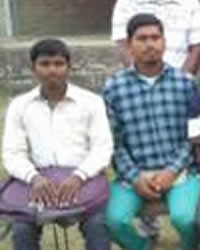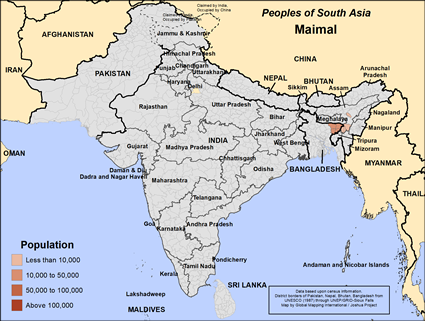The Maimal people of West Bengal, India, are a small ethnic group with deep roots in the northeastern regions of the state. Historically, they have lived in rural areas, relying on agriculture and natural resources for survival. The Maimal people share cultural ties with other indigenous communities in the region, but they have maintained a distinct identity through their language, customs and traditions. Over time, the Maimal people have adapted to socio-economic changes while continuing to preserve key aspects of their heritage.
The Maimal people primarily engage in subsistence farming, growing crops such as rice, maize and pulses. Their agricultural practices are influenced by the seasonal rains, and most families work together to cultivate the land. In addition to farming, many Maimal families keep livestock, such as goats and chickens, to supplement their diet and income. Some also engage in small-scale fishing, especially in areas near rivers and ponds.
Villages are tightly knit, with extended families living close to one another, creating strong community bonds. Homes are typically simple, built from local materials such as bamboo, mud and thatch. Daily life revolves around agricultural work, family responsibilities and community events. While some younger members of the Maimal community seek opportunities in nearby towns, many remain in their rural villages continuing to uphold their traditional way of life.
The Maimal people are officially Sunni Muslim, so they adhere to the Five Pillars of Islam. This includes emphasis on daily prayer, charity and pilgrimage among other things. Along with that, they depend on the spirit world, since they believe Allah is too distant to take care of their daily needs.
The Maimal people face several challenges, particularly in terms of economic development, education and healthcare. Their reliance on traditional farming methods makes them vulnerable to environmental changes, such as irregular rainfall and soil depletion, which can threaten their food security. The lack of access to modern farming techniques and resources further limits their agricultural productivity.
Educational opportunities are limited in Maimal villages, with many children not having access to quality schooling or higher education. This perpetuates cycles of poverty, as fewer economic opportunities are available to the community. Healthcare facilities are also scarce, leaving many without access to basic medical care. Development programs focusing on improving access to education, healthcare and sustainable agriculture would greatly benefit the Maimal people. These initiatives should be culturally sensitive and designed to empower the Maimal community while respecting their traditional values and way of life.
Pray for the Maimal people to understand and embrace that Jesus wants to bless their families and neighborhoods.
Pray for Holy Spirit anointed believers from the Maimal people to change their society from within.
Pray for a movement in which the Holy Spirit leads and empowers disciples to make more disciples.
Pray for a movement of Jesus to heal and strengthen Maimal communities.
Pray for a "Book of Acts" type of movement to Christ among the Maimal people of India and Bangladesh.
Scripture Prayers for the Maimal in India.
Ethnologue: Languages of the World
Reports from Indian NGOs on rural and indigenous communities
Academic research on indigenous groups in West Bengal
| Profile Source: Joshua Project |











